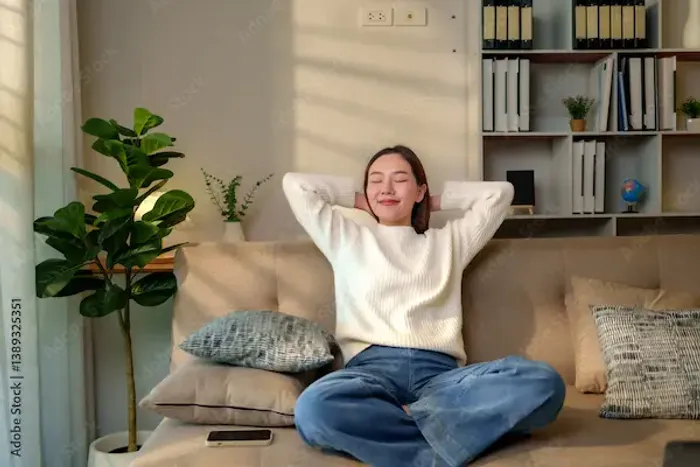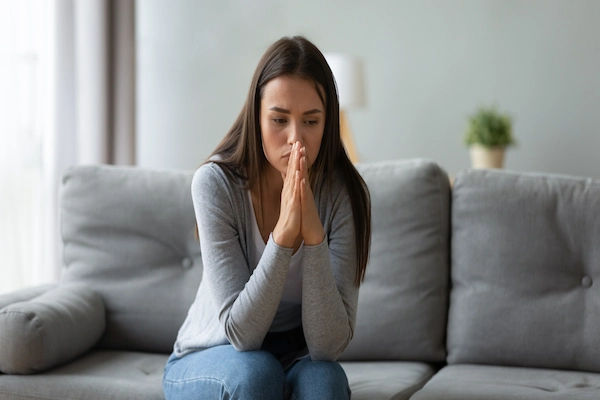Guide to Live Stress Free Life Forever
Discover practical, effective strategies to reduce stress, boost well-being, and live a calmer, more balanced life every day.

Written by Dr. Mohammed Kamran
Reviewed by Dr. Shaik Abdul Kalam MD (Physician)
Last updated on 13th Jan, 2026

Introduction
In our fast-paced, always-connected world, the quest to live stress free can feel like a distant dream. We juggle work deadlines, family responsibilities, and a constant stream of information, often leaving us feeling drained, anxious, and overwhelmed. But what if a stress-free life wasn't about eliminating all challenges, but about changing your relationship with them? This guide moves beyond quick fixes to provide a holistic framework for building lasting resilience and inner peace. We will explore not just what to do, but how to integrate these practices into the fabric of your daily life. From understanding the biology of stress to mastering your mindset and designing a calming environment, this comprehensive resource will equip you with the tools you need to reduce anxiety, manage pressure, and cultivate a profound sense of calm that lasts. Let's begin the journey toward a lighter, more peaceful you.
Understanding Stress: The Good, The Bad, and The Chronic
Before we can conquer stress, we must understand it. Stress is not inherently evil; it's a fundamental survival mechanism.
What is Stress, Really?
Stress is your body's response to any demand or threat. When you face a challenge, your body releases hormones like adrenaline and cortisol. This "fight-or-flight" response sharpens your senses, increases your heart rate, and boosts energy supplies, perfect for dealing with an immediate physical threat. This acute stress can be beneficial, helping you meet a deadline or avoid danger. It's a burst of energy and focus that subsides once the situation has passed.
When Stress Stops Helping and Starts Hurting
The problem arises when this emergency response is constantly triggered by modern, non-life-threatening pressures like traffic jams, financial worries, or an overflowing inbox. This leads to chronic stress, where your body remains in a heightened state of alert. Chronically elevated cortisol levels can wreak havoc on your health, contributing to issues like high blood pressure, a weakened immune system, insomnia, anxiety, and depression. Recognising the signs of chronic stress, such as irritability, fatigue, difficulty concentrating, and changes in sleep or appetite, is the first critical step toward managing anxiety effectively.
Consult a Psychologist for the best advice
The Foundation: Building a Stress-Resistant Lifestyle
A sturdy house needs a strong foundation. Similarly, a stress-free life is built on pillars of physical well-being. You cannot out-think a body that is deprived of its basic needs.
The Unbreakable Link Between Sleep and Stress
Sleep and stress have a bidirectional relationship: stress causes poor sleep, and poor sleep exacerbates stress. During deep sleep, your brain processes emotional information and clears out stress hormones. Aim for 7-9 hours of quality sleep per night. Create a relaxing bedtime routine: power down electronics an hour before bed, keep your room cool and dark, and avoid caffeine in the evening. If sleep troubles persist beyond two weeks, it may be helpful to consult a doctor online with Apollo24|7 to rule out underlying conditions like sleep apnoea.
Fueling Calm: Nutrition for a Stress-Free Mind
What you eat directly impacts your mood and stress levels. A diet high in processed foods, sugar, and unhealthy fats can promote inflammation and worsen anxiety. Instead, focus on whole foods. Complex carbohydrates (like oats and quinoa) help stabilise blood sugar. Omega-3 fatty acids (found in fatty fish and walnuts) and antioxidants (in berries and dark leafy greens) combat the cellular damage caused by stress. Don't skip meals, as low blood sugar can make you feel irritable and anxious.
Movement as Medicine: How Exercise Melts Stress Away
Physical activity is a powerful stress relief strategy. Exercise reduces levels of stress hormones like cortisol and stimulates the production of endorphins, your body's natural mood elevators. You don't need to run a marathon; a brisk 30-minute walk, a dance session in your living room, or a yoga practice can work wonders. The key is consistency. Find an activity you enjoy, making it a sustainable part of your routine for long-term stress relief.
Mastering Your Mind: Cognitive Techniques for Instant Calm
While the body is the foundation, the mind is the control center. The most powerful techniques for managing anxiety are cognitive.
The Power of Mindfulness and Meditation
Mindfulness is the practice of anchoring your awareness in the present moment without judgment. It breaks the cycle of ruminating about the past or worrying about the future, the primary sources of stress. Simple practices include focusing on your breath, doing a body scan, or mindfully drinking a cup of tea. Meditation apps can provide excellent guided sessions. Even 5-10 minutes daily can significantly reduce anxiety and improve your emotional well-being.
Cognitive Reframing: Changing Your Stressful Thoughts
Cognitive reframing, a key component of Cognitive Behavioral Therapy (CBT), involves identifying and challenging negative thought patterns. For example, if you think, "I'm going to fail this presentation," reframe it to, "This is a challenge, and I am prepared to do my best." This isn't about positive thinking; it's about realistic thinking. By changing your perception of a stressor, you change your body's physiological response to it. This is a cornerstone of building resilience to stress.
Designing a Stress-Free Environment
Your surroundings have a profound impact on your mental state. Creating a peaceful environment is a crucial step to live stress free.
Declutter Your Space, Declutter Your Mind
Clutter is visual noise. It constantly signals to your brain that there's work to be done, creating low-grade anxiety. A cluttered desk or a messy home can make it difficult to relax. Dedicate time to decluttering your physical spaces. The KonMari method or simple 15-minute daily tidy-ups can create a sense of order and calm, directly reducing feelings of being overwhelmed.
Setting Digital Boundaries for Mental Peace
The constant pings of notifications are a major source of modern stress. To achieve a stress-free life, you must curate your digital environment. Implement tech boundaries: turn off non-essential notifications, schedule specific times to check email and social media, and establish a "no phones in the bedroom" rule. Consider a digital detox one day a week. This helps reclaim your attention and reduces the comparison and information overload that fuels anxiety.
The Social Dimension: Building a Support System
Humans are social creatures, and connection is a powerful antidote to stress.
The Art of Saying "No" and Setting Boundaries
A significant source of stress is overcommitment. Learning to say "no" respectfully is not selfish; it's essential for protecting your time and energy. Set clear boundaries at work and in personal relationships. Communicate your limits honestly. This prevents resentment and burnout, allowing you to be more present and engaged when you do say "yes."
Leaning on Your Network: The Importance of Connection
Don't underestimate the power of a good conversation. Talking about your worries with a trusted friend, family member, or partner can provide perspective, validation, and support. Social connection releases oxytocin, a hormone that naturally reduces stress. Make time for meaningful, face-to-face interactions. If you feel you lack a support system, consider joining a club, group, or class based on your interests.
When to Seek Professional Help
While lifestyle changes are powerful, sometimes stress becomes unmanageable on its own. If your stress feels overwhelming, persists for a long time, leads to significant changes in sleep or appetite, or causes you to withdraw from life, it's crucial to seek help. Therapists and counsellors can provide tools like CBT and other therapies that are highly effective for anxiety management and treating chronic stress.
Conclusion: Your Journey to Lasting Peace
Living a completely stress-free life is not about creating a bubble with no challenges. It's about building a robust toolkit comprising physical health, mental mastery, a supportive environment, and strong social connections that allows you to navigate life's inevitable ups and downs with grace and resilience. This is a journey of small, consistent steps. Start by integrating one or two strategies from this guide, such as a 10-minute walk or a digital curfew. Be patient and compassionate with yourself. Over time, these practices will compound, transforming your relationship with stress and leading you toward a more peaceful, balanced, and joyful existence. The power to cultivate calm is within you. Start today.
Consult a Psychologist for the best advice
Consult a Psychologist for the best advice

Ms. Moumita Ganguly
Psychologist
13 Years • B.ED(Special) Visual Impairment , PG.Diploma in Rehabilitation psychology
Kolkata
M’s Clinic, Kolkata
(150+ Patients)

Dr. Anannya Roy
Psychiatrist
6 Years • MBBS, MD (Psychiatry)
Kolkata
VDC Clinic, Kolkata

Ms. Sridevi
Counselling Psychologist
5 Years • BSC,MSC Clinical Psychology
Bengaluru
Apollo Medical Center, Marathahalli, Bengaluru

Dr. Richa Kumari
Psychiatrist
10 Years • MBBS, DPM (Psychiatrist)
Bangalore
Apollo Clinic Bellandur, Bangalore
(175+ Patients)

Ms. Mansi Kothari
Psychologist
7 Years • MA - Psychology
Gurugram
Soulful, Gurugram
(75+ Patients)
Consult a Psychologist for the best advice

Ms. Moumita Ganguly
Psychologist
13 Years • B.ED(Special) Visual Impairment , PG.Diploma in Rehabilitation psychology
Kolkata
M’s Clinic, Kolkata
(150+ Patients)

Dr. Anannya Roy
Psychiatrist
6 Years • MBBS, MD (Psychiatry)
Kolkata
VDC Clinic, Kolkata

Ms. Sridevi
Counselling Psychologist
5 Years • BSC,MSC Clinical Psychology
Bengaluru
Apollo Medical Center, Marathahalli, Bengaluru

Dr. Richa Kumari
Psychiatrist
10 Years • MBBS, DPM (Psychiatrist)
Bangalore
Apollo Clinic Bellandur, Bangalore
(175+ Patients)

Ms. Mansi Kothari
Psychologist
7 Years • MA - Psychology
Gurugram
Soulful, Gurugram
(75+ Patients)
More articles from Stress
Frequently Asked Questions
1. Is it really possible to live a completely stress-free life?
No, and that's not the goal. Stress is a natural part of life. The objective is to eliminate unnecessary stress and build the resilience to handle inevitable stressors effectively without letting them harm your health or happiness.
2. What is the fastest way to relieve stress at the moment?
For immediate relief, try the '4-7-8' breathing technique: inhale through your nose for 4 seconds, hold your breath for 7 seconds, and exhale slowly through your mouth for 8 seconds. This activates the parasympathetic nervous system, triggering relaxation.
3. How can I stop feeling so overwhelmed at work?
Break tasks into smaller, manageable steps. Prioritise your top 3 tasks for the day. Use time-management techniques like the Pomodoro Method (25 minutes of focused work, followed by a 5-minute break). Most importantly, communicate with your manager about realistic deadlines.
4. Can diet really affect my anxiety levels?
Absolutely. Blood sugar spikes and crashes from sugary foods can mimic anxiety symptoms. A diet rich in whole foods, healthy fats, and complex carbs provides steady energy and nutrients that support brain health and stabilise mood.
5. When should I consider therapy for stress?
If stress is interfering with your daily functioning, impacting your work, relationships, sleep, or overall joy for more than two weeks, it's a good idea to seek professional guidance. A therapist can provide personalised tools for managing anxiety and building resilience.




